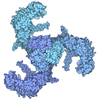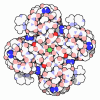+ Open data
Open data
- Basic information
Basic information
| Entry | Database: PDB / ID: 3.0E+86 | ||||||
|---|---|---|---|---|---|---|---|
| Title | High resolution Crystal Structure of the open NaK channel pore | ||||||
 Components Components | Potassium channel protein | ||||||
 Keywords Keywords |  MEMBRANE PROTEIN / non-selective cation channel / MEMBRANE PROTEIN / non-selective cation channel /  tetrameric cation channel family / 2-transmembrane helix channels / tetrameric cation channel family / 2-transmembrane helix channels /  Ionic channel Ionic channel | ||||||
| Function / homology |  Function and homology information Function and homology information potassium channel activity / potassium channel activity /  membrane / identical protein binding / membrane / identical protein binding /  metal ion binding metal ion bindingSimilarity search - Function | ||||||
| Biological species |   Bacillus cereus (bacteria) Bacillus cereus (bacteria) | ||||||
| Method |  X-RAY DIFFRACTION / X-RAY DIFFRACTION /  SYNCHROTRON / SYNCHROTRON /  MOLECULAR REPLACEMENT / MOLECULAR REPLACEMENT /  molecular replacement / Resolution: 1.6 Å molecular replacement / Resolution: 1.6 Å | ||||||
 Authors Authors | Jiang, Y. / Alam, A. | ||||||
 Citation Citation |  Journal: Nat.Struct.Mol.Biol. / Year: 2009 Journal: Nat.Struct.Mol.Biol. / Year: 2009Title: High-resolution structure of the open NaK channel Authors: Alam, A. / Jiang, Y. | ||||||
| History |
|
- Structure visualization
Structure visualization
| Structure viewer | Molecule:  Molmil Molmil Jmol/JSmol Jmol/JSmol |
|---|
- Downloads & links
Downloads & links
- Download
Download
| PDBx/mmCIF format |  3e86.cif.gz 3e86.cif.gz | 53.2 KB | Display |  PDBx/mmCIF format PDBx/mmCIF format |
|---|---|---|---|---|
| PDB format |  pdb3e86.ent.gz pdb3e86.ent.gz | 38.9 KB | Display |  PDB format PDB format |
| PDBx/mmJSON format |  3e86.json.gz 3e86.json.gz | Tree view |  PDBx/mmJSON format PDBx/mmJSON format | |
| Others |  Other downloads Other downloads |
-Validation report
| Arichive directory |  https://data.pdbj.org/pub/pdb/validation_reports/e8/3e86 https://data.pdbj.org/pub/pdb/validation_reports/e8/3e86 ftp://data.pdbj.org/pub/pdb/validation_reports/e8/3e86 ftp://data.pdbj.org/pub/pdb/validation_reports/e8/3e86 | HTTPS FTP |
|---|
-Related structure data
| Related structure data | |
|---|---|
| Similar structure data |
- Links
Links
- Assembly
Assembly
| Deposited unit | 
| |||||||||||||||||||||||||||||||||
|---|---|---|---|---|---|---|---|---|---|---|---|---|---|---|---|---|---|---|---|---|---|---|---|---|---|---|---|---|---|---|---|---|---|---|
| 1 | 
| |||||||||||||||||||||||||||||||||
| 2 | 
| |||||||||||||||||||||||||||||||||
| Unit cell |
| |||||||||||||||||||||||||||||||||
| Components on special symmetry positions |
|
- Components
Components
-Protein , 1 types, 2 molecules AB
| #1: Protein |  Mass: 10706.538 Da / Num. of mol.: 2 / Fragment: transmembrane domain, RESIDUES 19-110 Source method: isolated from a genetically manipulated source Source: (gene. exp.)   Bacillus cereus (bacteria) / Plasmid: pQE60 / Production host: Bacillus cereus (bacteria) / Plasmid: pQE60 / Production host:   Escherichia coli (E. coli) / Strain (production host): SG13009 / References: UniProt: Q81HW2 Escherichia coli (E. coli) / Strain (production host): SG13009 / References: UniProt: Q81HW2 |
|---|
-Non-polymers , 5 types, 161 molecules 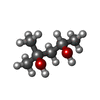








| #2: Chemical |  2-Methyl-2,4-pentanediol 2-Methyl-2,4-pentanediol#3: Chemical | #4: Chemical | ChemComp-CA / | #5: Chemical | ChemComp-NA / #6: Water | ChemComp-HOH / |  Water Water |
|---|
-Experimental details
-Experiment
| Experiment | Method:  X-RAY DIFFRACTION / Number of used crystals: 1 X-RAY DIFFRACTION / Number of used crystals: 1 |
|---|
- Sample preparation
Sample preparation
| Crystal | Density Matthews: 2.41 Å3/Da / Density % sol: 49 % |
|---|---|
Crystal grow | Temperature: 293 K / Method: vapor diffusion, sitting drop / pH: 9.5 Details: 100mM Glycine buffer, 55-70% (4S)-2-Methyl-2,4-pentanediol (MPD), 1mM CaCl2, pH 9.5, vapor diffusion, sitting drop, temperature 293K, VAPOR DIFFUSION, SITTING DROP |
-Data collection
| Diffraction | Mean temperature: 100 K |
|---|---|
| Diffraction source | Source:  SYNCHROTRON / Site: SYNCHROTRON / Site:  APS APS  / Beamline: 23-ID-D / Beamline: 23-ID-D |
| Detector | Type: MARMOSAIC 300 mm CCD / Detector: CCD |
| Radiation | Protocol: SINGLE WAVELENGTH / Monochromatic (M) / Laue (L): M / Scattering type: x-ray |
| Radiation wavelength | Relative weight: 1 |
| Reflection | Resolution: 1.6→50 Å / Num. obs: 25448 |
-Phasing
Phasing | Method:  molecular replacement molecular replacement |
|---|
- Processing
Processing
| Software |
| ||||||||||||||||||||||||||||
|---|---|---|---|---|---|---|---|---|---|---|---|---|---|---|---|---|---|---|---|---|---|---|---|---|---|---|---|---|---|
| Refinement | Method to determine structure : :  MOLECULAR REPLACEMENT / Resolution: 1.6→34.01 Å / Occupancy max: 1 / Occupancy min: 0.64 / σ(F): 0 MOLECULAR REPLACEMENT / Resolution: 1.6→34.01 Å / Occupancy max: 1 / Occupancy min: 0.64 / σ(F): 0
| ||||||||||||||||||||||||||||
| Solvent computation | Bsol: 133.062 Å2 | ||||||||||||||||||||||||||||
| Displacement parameters | Biso max: 81.2 Å2 / Biso mean: 37.558 Å2 / Biso min: 13.1 Å2
| ||||||||||||||||||||||||||||
| Refinement step | Cycle: LAST / Resolution: 1.6→34.01 Å
| ||||||||||||||||||||||||||||
| Refine LS restraints |
| ||||||||||||||||||||||||||||
| Xplor file |
|
 Movie
Movie Controller
Controller




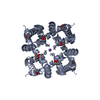
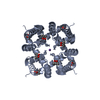

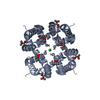
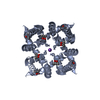








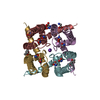

 PDBj
PDBj